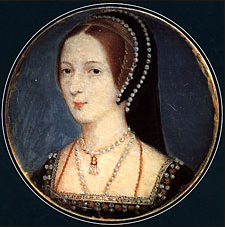
Outside of school I got most of my historical knowledge from this book, The Very Bloody History of Britain Without the Boring Bits which taught me that Mrs. Fitzherbert died laughing*, that the English archers invented the V sign to tell the French 'go forth and multiply' (I am not ashamed to tell you now it was a good 15 years before I got that) and that Queen Victoria had to propose to Albert, on account of her being his superior.
The book and school learning neglected to tell me that Anne Boleyn was a very interesting character rather than just a pretty girl waiting to be swept up by the king only for him to tire of her. Which powers of deduction tell you she would have to be, really, in order to be involved with changing the course of England and Catholicism. It wasn't until I wrote a radio play about the 6 wives being resurrected and invited onto a Jeremy Kyle-esque show that research told me Boleyn, had she been alive now, would be one to watch.
| Hilary Mantel puts it best on how history allows us to remember Boleyn: "She takes on the colour of our fantasies and is shaped by our preoccupations: witch, bitch, feminist, sexual temptress, cold opportunist." I've heard worse, but it seems a little unfair and dismissive. | Being the king a back up plan wasn't required and Anne was executed |
What strikes me about the relationship she had with Henry compared to the other wives is just that. Anne's Henry is the dashing, tall king. Not the old, obese and gouty, son obsessed Church head. It seems to have truly been a partnership, cruelly cut short by the various pitfalls and vaingloriousness of any royal court. But most of all it was cut short it seems by marriage. Their courtship features letters full of ideas and teases and fondness. Their marriage, according to contemporaries, was fractious. Anne was jealous and they would bicker constantly. You are not supposed to bicker with the king.
After the disappointment of giving birth to a daughter, it all went downhill. On the day of Katherine of Aragon's funeral Anne miscarried a male foetus and it was over. According to my bloody history book Henry had plans to cite the third breast (or mole on her neck) and sixth finger as signs of witchcraft if the charge of treason and adultery didn't stick on the 2nd of May when she was imprisoned. Being the king a back up plan wasn't required and Anne was executed.
Anne also never suffered fools gladly but in doing so made enemies at court. She never forgave Cardinal Wolsey for calling her a foolish girl. The idea of this woman who apparently had some physical deformities (exaggerated overtime by her enemies of course), wasn't stunning but used her wit and 'duckies' (what Henry sincerely called her breasts) to enthral half the court and its king.
That's what makes Anne Boleyn one of the most fascinating of the wives (Parr is another favourite of mine for almost matching Henry's marital record), her ordinariness and her use of her strengths.
*the biographies of Georgiana, Duchess of Devonshire and Mary Robinson don't mention Mrs. Fitzherbert's jolly end and nor does Wikipedia. Only specific googling provides iffy answers...
Squeamish Kate


 RSS Feed
RSS Feed
